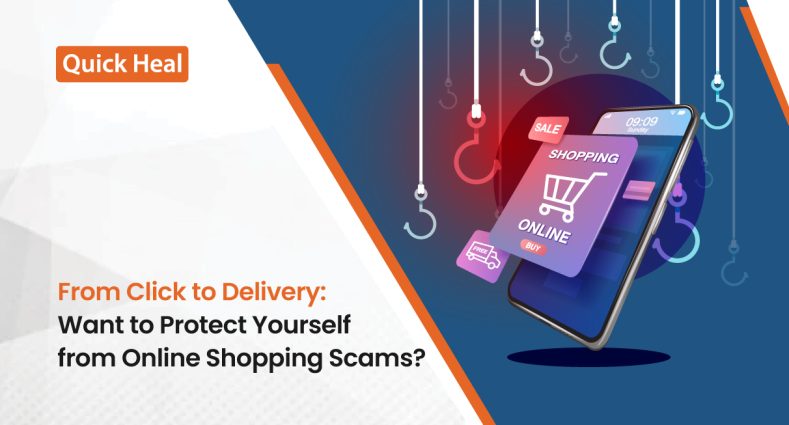From Click to Delivery: Want to Protect Yourself from Online Shopping Scams?

Did you know that one out of three people, globally, shop online?
As of 2024, there are 2.64 billion online shoppers. E-commerce platforms and the rise of mobile shopping apps have accelerated the trend of online shopping. The downside? When you have so much volume and market value involved, scams are inevitable. The e-commerce industry has been a victim of fraud since its origin. E-commerce companies lose approximately USD 48 billion to fraud each year. The number of consumers who have been victims of payment fraud has touched 43%.
Want to protect yourself from these online shopping scams and fraudulent websites?
This blog covers everything you must know about online scams and how you can ensure that you stay safe and have a smooth online shopping experience.
5 Common Online Shopping Scams You Need to Know
While online shopping offers convenience and deals, hidden dangers lurk! From fake websites to phishing, even the most common online shopping scams are sometimes difficult to spot. Here are a few you must know about:
- Phishing emails: Scammers send fake emails pretending to be from legitimate retailers. They will ask for your personal information or direct you to fake websites to steal your data.
- Fraud websites: Fraudsters create fake online stores with attractive prices to lure shoppers. They steal your credit card information without delivering the promised goods.
- Non-delivery scams: Sellers accept payment but never ship the purchased items. This leaves you with no recourse to retrieve money or the products you ordered.
- Counterfeit goods: Online sellers offer fake versions of popular products at discounted prices.
- Overpayment scams: Scammers send dishonest money orders for more than the agreed-upon amount. Then they will ask you to refund the excess, only for the original payment to bounce.
Still not convinced? Here is a real-world example that will help you understand the nature of fraud!
In 2023, a senior citizen from Mumbai lost Rs 8.3 lakhs while purchasing towels online! After calling the bank’s helpline, she realized that a total of Rs 8.3 lakhs was deducted from her account after she made an initial transaction of Rs. 1670. The scammer pretended to be a bank employee to win the woman’s trust. Afterward, he forced her to download an app that gave him access to her phone. The fraudster then acquired all her private information, including her bank account numbers. She tried contacting the bank assistance number but it was fake. She lost Rs. 8.3 lakhs on account of ordering from a fraud website.
Here’s another example — Recently, when Lulu Adams attempted to buy a new pair of shoes for work. The 25-year-old claimed that after searching for loafers online, she began to receive targeted advertisements on Facebook and Instagram. Adams saw the exact pair of loafers on another site for 50% of the price and placed an order. Adams got a confirmation email, but when the shoes didn’t come three weeks later, she began to have doubts. When she looked up the merchant online, she was unable to discover any information.”I returned to the website and chose to browse around. I discovered the website was a hoax when I saw all the links were to dead websites,” Adams claimed.
Behind the Shield: Exploring Quick Heal’s Robust Protection Features
In such tricky scenarios, it is crucial to be safe rather than sorry! Quick Heal can come to your rescue here. Quick Heal Total Security offers robust protection against online shopping scams. Its real-time website protection warns you about dangerous websites. The browsing protection feature prevents you from falling victim to phishing or malware attacks. For example, if you visit a fraudulent online store, Quick Heal will block access to the site and display a warning message. Its Total Security feature further safeguards your online shopping experience by safeguarding you from falling prey to online shopping scams and ensuring a safe and secure browsing experience.
Spotting Red Flags: How to Identify and Avoid Online Shopping Scams
Until now you’ve understood the type of online shopping scams. You also know how big these scams are. Here is how you can avoid them:
- Shop on secure websites.
- Use strong, unique passwords.
- Beware of phishing emails.
- Keep your software updated.
- Use trusted payment methods (credit cards, PayPal).
- Review privacy policies.
- Avoid public Wi-Fi for transactions.
- Check bank statements for unauthorized charges.
- Enable two-factor authentication.
Moving Forward
Staying alert while shopping online is important to safeguard personal and financial information. Quick Heal Total Security plays a vital role by offering a robust antivirus for PC solution for you and your family. With its proactive measures, it ensures a safer online shopping experience, making it easy for users to mitigate risks and enjoy peace of mind.
Do you shop online? Have you ever been exposed to any scam related to online shopping? Do you fear becoming a victim of online shopping fraud?
If your answer to any of the above questions is yes, then you must check out Quick Heal Total Security. Keep your online identity safe and private on the internet at an affordable price of only Rs. 1591 a year with Quick Heal!



No Comments, Be The First!